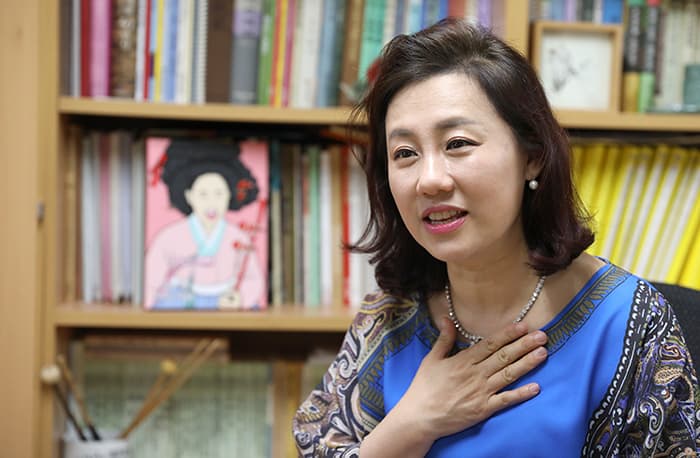
Kang Eun Il, who plays the haeguem, a traditional two-stringed string instrument, talks about her performance during the banquet at the April 27 Inter-Korean Summit, at Dankook University in Yongin on May 30.
By Xu Aiying and Hahm Hee-eun
Photos = Kim Sunjoo
Yongin | June 4, 2018
“The haegeum, a traditional two-stringed string instrument, makes its sound with just two strings. It seems like it’s telling the tale of the two Koreas, south and north, hostility and peace, a string of laughter and another of sorrow.”
Haegeum player Kang Eun Il, who performed during the banquet at the April 27 Inter-Korean Summit along with prestigious musicians such as pianist Jeong Jae-il, guitarist Lee Byung-woo, and singer Oh Yeon-jun, explained what is to her the significance of the haegeum’s two strings.
The banquet for the leaders of the two Koreas started with a duet between a South Korean playing the haegeumand a North Korean playing an ongnyugeum (옥류금), a modern-day 33-stringed zither. Kang said, “The way to make a sound is different for the two musical instruments, but we overcame the differences and played a beautiful piece of music together in perfect harmony. I hope that the two Koreas can also create such harmony.“
Korea.net visited with Kang, who’s currently an associate professor of traditional music at Dankook University. She shared her thrilling experience during the 2018 Inter-Korean Summit, in Yongin on May 30.
Q. How did you get the opportunity to perform at the banquet of April 27 Inter-Korean Summit?
“I was in contact with Cheong Wa Dae before the April 27 Inter-Korean Summit. The given mission was to play the haegeum with another traditional musician for 3 minutes and 40 seconds. I was worried about how I would arrange the song, and what kind of instrument I would perform with. I had been worrying all night before the performance.”
Q. What was the preparation process like?
Since the banquet was for the meeting between the leaders of the two Koreas, I thought that it would be nice to have music from the two Koreas, too. If there is the haegeum in South Korea, I looked for a matching musical instrument in North Korean traditional music. At last, I found that Oh Jeong-hee, who originally played the gayageum, a traditional 12-stringed zither at the Seongnam Metropolitan Traditional Music Orchestra, also knows how to play North Korea’s newer ongnyugeum 33-stringed zither. Hence, I suggested a duet together.
The songs I chose were “Glad to Meet You” from North Korea and “From Seoul to Pyongyang” from South Korea. Just like the lyrics, I was really glad to be able to meet North Koreans face-to-face, and I wondered how good it would be if I could just take a taxi and go from Seoul to Pyeongyang with a taxi fare of only KRW 50,000. The selection of the songs was made with such thoughts and desires.
Q. What was the atmosphere like when you performed the duet between a haegeum and a ongnyugeum at the banquet?
Right before the banquet, the leaders of the two Koreas announced the Panmunjeom Declaration. When I waited for my performance, I saw them entering the banquet hall with bright smiles. I was able to feel a new strength in the air there. Everyone in the hall greeted each other, laughed, and the atmosphere was very soothing.
After the performance, everyone including the leaders of the two Koreas gave a warm applause. I think first lady Kim Jung-sook and the wife of the North Korean leader, Lee Sol Ju, were especially interested in the performance because they majored in music.”
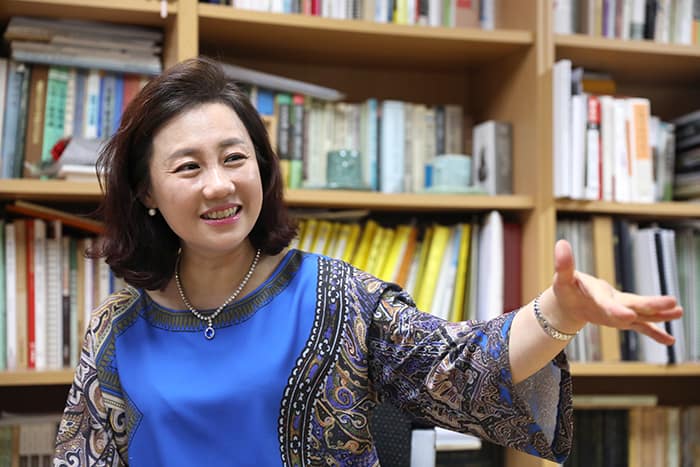
Kang Eun Il, a haegeum player, explains North Korea’s modern musical instrument the ongnyugeum at Dankook University in Yongin on May 30.
Q. Could you explain to us about the ongnyugeum?
“During the 1970s, traditional musical instruments in North Korea were arranged under the command of Kim Jong Il, the former chairman of the State Affairs Commission. The ongnyugeum was invented at that time, and the name of the musical instrument was directly designated by Kim Jong Il. It’s a large, modern box zither with 33 nylon-wrapped metal strings.
Q. What was the most inspiring moment during the performance?
“The banquet hall wasn’t huge. In fact, I think it was the smallest hall in which I’ve ever performed, but the meaning was definitely the largest. While having to listen to the Panmunjeom Declaration at the actual spot, and preparing for the performance, I saw a bright future in between the two Koreas.”
Q. Any hopes for the future in terms of inter-Korean musical exchanges?
“Traditional music was lacking in the North Korean performance at the PyeongChang 2018 Olympic and Paralympic Winter Games in February and also for the Korean art troupe that performed in Pyeongyang in April. If more arts and cultural exchanges are made between the two Koreas, I hope for collaboration performances in traditional music, as well. If traditional musicians from the two Koreas meet, I’m sure that our collective data and information would extend the range of traditional Korean music.
Every year, I’ve had a solo recital, and this year it will be by 23rd. For my 26th solo recital, I’d love to perform in Pyeongyang.
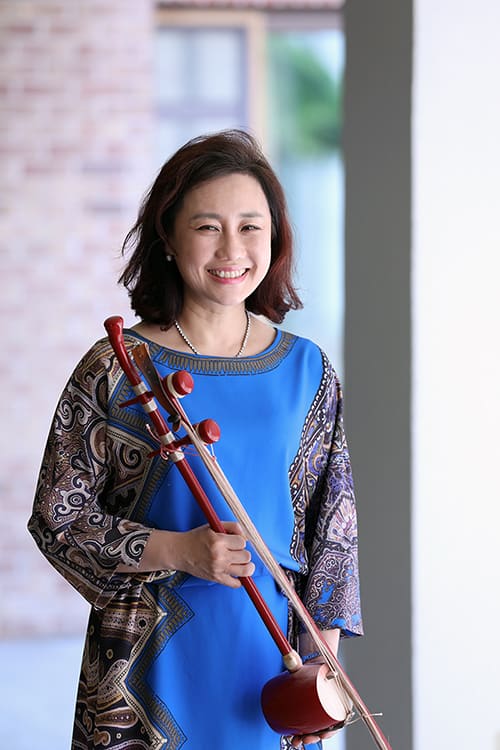
Kang Eun Il, a haegeum player, poses with the haegeum that she played during her recent performance at the Inter-Korean Summit.
xuaiy@korea.kr


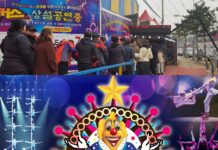
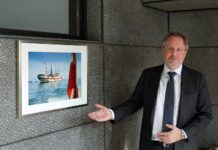



![[K-brand-promoting ethnic Koreans ⑤] Spreading taekwondo ‘spirit’ in Singapore](https://gangnam.com/file/2024/02/20231129124433000_ENU3D0FB-218x150.png)















